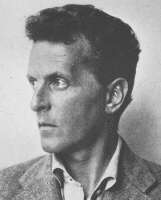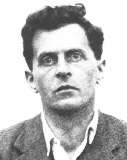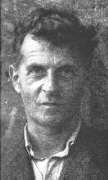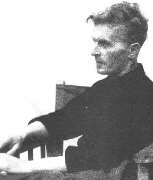Philosophy Pages
| Dictionary | Study Guide | Logic | F A Q s | ||
|---|---|---|---|---|---|---|
| History | Timeline | Philosophers | Locke | |||
Philosophy Pages
| Dictionary | Study Guide | Logic | F A Q s | ||
|---|---|---|---|---|---|---|
| History | Timeline | Philosophers | Locke | |||

|
Life and Works . . Picture Theory . . Fact and Value . . New Methods . . Language Games . . Private Language Bibliography Internet Sources |
Raised in a prominent Viennese family, Ludwig Wittgenstein studied engineering in Germany and England, but became interested in the foundations of mathematics and pursued philosophical studies with Moore at Cambridge before entering the Austrian army during World War I. The notebooks he kept as a soldier became the basis for his Tractatus, which later earned him a doctorate and exerted a lasting influence on the philosophers of the Vienna circle. After giving away his inherited fortune, working as a village schoolteacher in Austria, and designing his sister's Vienna home, Wittgenstein returned to Cambridge, where he developed a new conception of the philosophical task. His impassioned teaching during this period influenced a new generation of philosophers, who tried to capture it in The Blue and Brown Books (dictated 1933-35). From the late 'thirties, Wittgenstein himself began writing the materials which would be published only after his death.
In the cryptic Logische-Philosophische Abhandlung
(Tractatus Logico-Philosophicus) (1922),
 the earlier Wittgenstein extended
Russell's notion of logical analysis by describing a world composed of
facts, pictured by thoughts, which are in turn expressed by the propositions of a logically structured language.
On this view, atomic sentences express the basic data of sense experience, while the
analytic propositions of logic and mathematics are merely formal
tautologies.
Anything else is literally nonsense, which Wittgenstein regarded as
an attempt to speak about what cannot be said.
Metaphysics and ethics, he supposed, transcend the limits of human language.
Even the propositions of the Tractatus itself are of merely temporary use, like that of a ladder one can discard after having climbed up it: they serve only as useful reminders of the boundaries of our linguistic ability.
This work provided the philosophical principles upon which the
logical positivists relied in their development of a narrowly anti-metaphysical standpoint.
the earlier Wittgenstein extended
Russell's notion of logical analysis by describing a world composed of
facts, pictured by thoughts, which are in turn expressed by the propositions of a logically structured language.
On this view, atomic sentences express the basic data of sense experience, while the
analytic propositions of logic and mathematics are merely formal
tautologies.
Anything else is literally nonsense, which Wittgenstein regarded as
an attempt to speak about what cannot be said.
Metaphysics and ethics, he supposed, transcend the limits of human language.
Even the propositions of the Tractatus itself are of merely temporary use, like that of a ladder one can discard after having climbed up it: they serve only as useful reminders of the boundaries of our linguistic ability.
This work provided the philosophical principles upon which the
logical positivists relied in their development of a narrowly anti-metaphysical standpoint.
But just as his theories began to transform twentieth-century philosophy,
 Wittgenstein himself became convinced that they were mistaken
in demanding an excessive precision from human expressions.
The work eventually published in the Philosophical Investigations (1953) pursued an different path.
In ordinary language, he now supposed, the meaning of words is more loosely aligned with their use in
a variety of particular "language games."
Direct reference is only one of many ways in which our linguistic activity may function, and the picturing of reality is often incidental to its success.
Belief that language can perfectly capture reality is a kind of bewitchment, Wittgenstein now proposed.
Thus, philosophy is properly a therapeutic activity, employed to relieve the puzzlement generated by (philosophical) misuses of ordinary language.
Wittgenstein himself became convinced that they were mistaken
in demanding an excessive precision from human expressions.
The work eventually published in the Philosophical Investigations (1953) pursued an different path.
In ordinary language, he now supposed, the meaning of words is more loosely aligned with their use in
a variety of particular "language games."
Direct reference is only one of many ways in which our linguistic activity may function, and the picturing of reality is often incidental to its success.
Belief that language can perfectly capture reality is a kind of bewitchment, Wittgenstein now proposed.
Thus, philosophy is properly a therapeutic activity, employed to relieve the puzzlement generated by (philosophical) misuses of ordinary language.

In particular, the philosophical tradition erred in supposing that simple reports of subjective individual experience are primary sources for human knowledge. Efforts to employ a private language as expressions of interior mental states, for example, Wittgenstein argued to be an avoidable mistake that had caused great difficulties in the philosophy of mind. His views on this issue were a significant influence on Ryle and others. In his later work, Wittgenstein applied this method of analysis to philosophical problems related to epistemology, mathematics, and ethics.
|
Recommended Reading:
Primary sources:
Secondary sources:
Additional on-line information about Wittgenstein includes:
|
